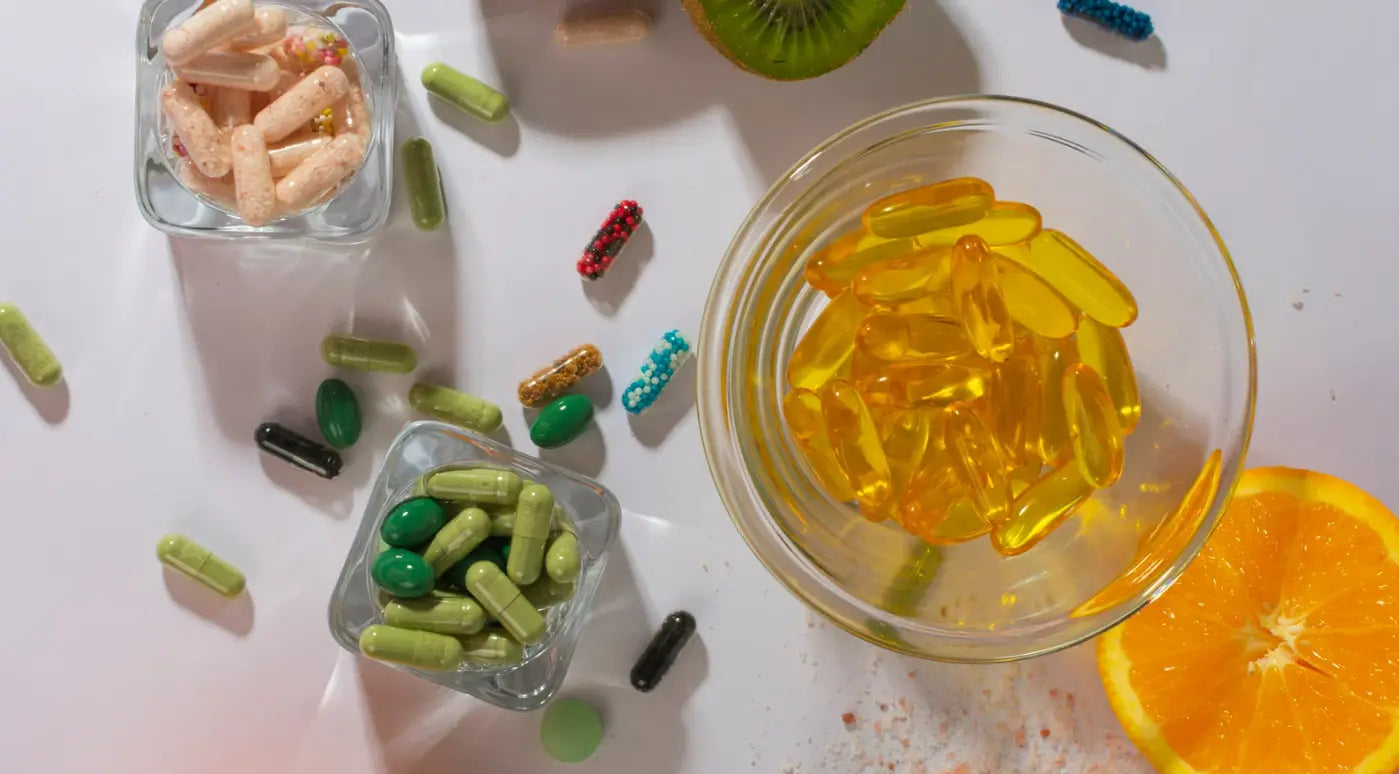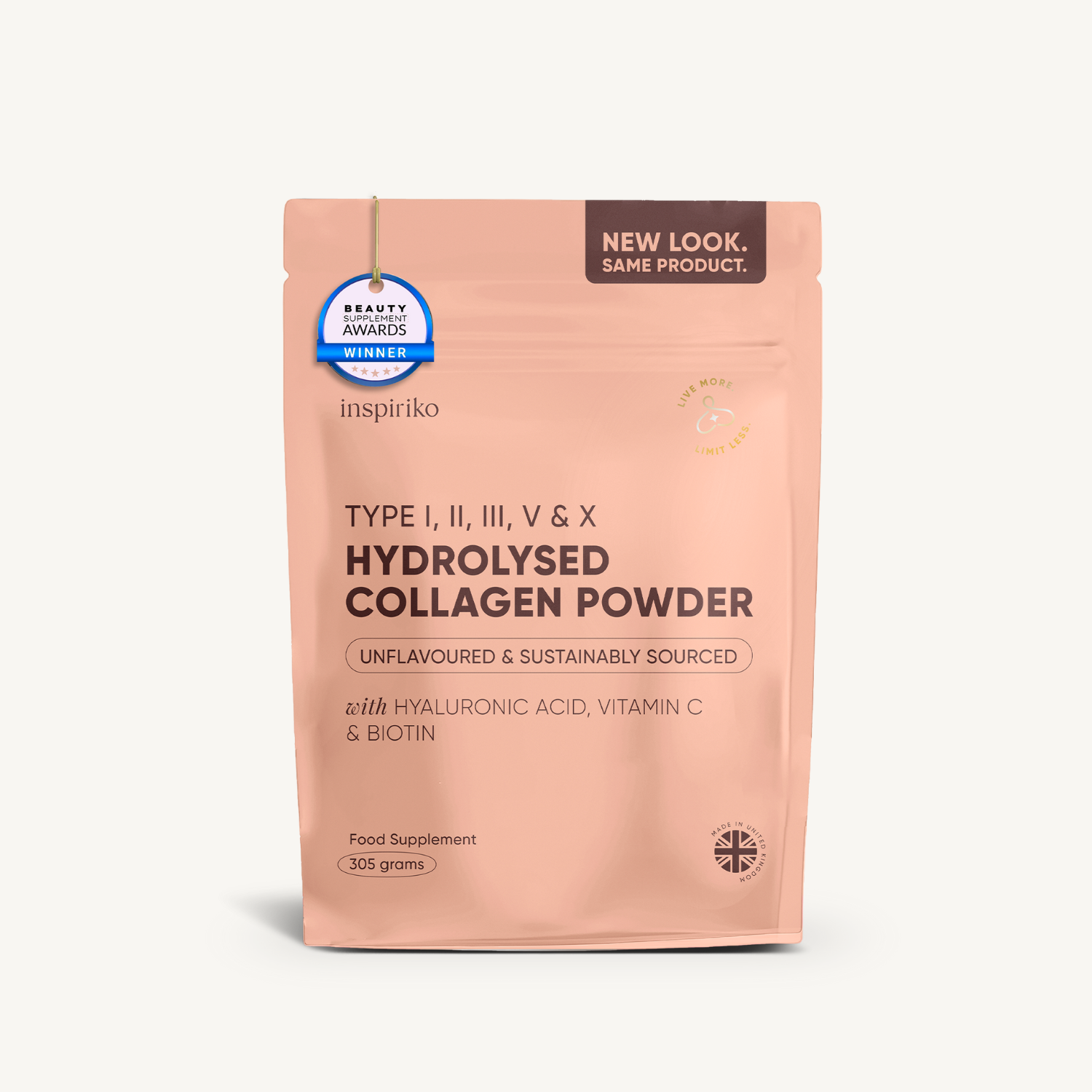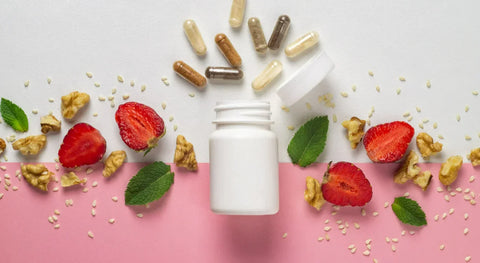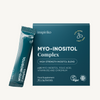If you’re one of the many women navigating the ups and downs of PCOS, you already know—it’s more than just a hormonal imbalance. It’s fatigue that lingers long after a full night’s sleep, a cycle that shows up on its own terms, and skin that just won’t cooperate. It’s the uncertainty, the frustration, and at times, the overwhelm of managing a condition that affects nearly 1 in 10 women.
For years, the conversation around PCOS has centred around medication—often hormonal birth control, insulin sensitisers, or fertility drugs. While these options can be effective for some, many of us are looking for a more natural, supportive approach that works with our bodies rather than against them.
That’s where natural supplements for PCOS come in. Backed by emerging science and time-tested traditional medicine, they offer a holistic way to rebalance hormones, support metabolic health, and ease symptoms—without the harsh side effects of conventional treatments. In this blog, we’ll explore why choosing natural supplements could be the gentler, more empowering step your body has been waiting for.

Understanding PCOS – Symptoms and Causes
Before we dive into the best supplements for PCOS, it’s important to understand what’s really happening in the body. Polycystic Ovary Syndrome (PCOS) is a complex condition that affects how your ovaries function. It’s driven by a trio of imbalances: hormones, metabolism, and inflammation.
So, what exactly causes PCOS?
At its core, PCOS is a hormonal disorder. Women with PCOS often produce higher-than-normal levels of androgens—commonly known as “male hormones.” These can interfere with ovulation, leading to irregular or absent periods and the formation of small cysts in the ovaries (hence the name). But that’s just the surface.
Behind the scenes, many women with PCOS also struggle with insulin resistance—a condition where the body’s cells don’t respond properly to insulin, causing the pancreas to produce even more. This excess insulin can trigger the ovaries to make more androgens, setting off a cascade of symptoms.
You might notice:
-
Irregular menstrual cycles
-
Weight gain, especially around the belly
-
Persistent acne or oily skin
-
Hair thinning or excessive facial/body hair
-
Fatigue, mood swings, or low libido
Over time, unmanaged PCOS can increase the risk of more serious health issues—like type 2 diabetes, heart disease, and infertility. That’s why early, proactive support is key. By addressing the root causes—rather than just the symptoms—natural supplements for PCOS offer a powerful path to rebalancing. They support insulin sensitivity, hormone production, and inflammation—all while nurturing your body in a way that feels sustainable and aligned with your long-term well-being.
💡Did You Know? PCOS symptoms often start in the late teens or early 20s - but many women don’t get diagnosed until years later.
Want to know more? Check out: What Are the Causes of PCOS? Key Risk Factors You Should Know.
Why Consider Natural Supplements for PCOS?
Conventional treatments for PCOS often start and end with prescription medications—birth control pills to regulate cycles, insulin sensitisers to manage blood sugar, or fertility drugs to induce ovulation. While these may be necessary in some cases, they’re not always a long-term solution. Many women find themselves dealing with side effects like mood swings, weight gain, or nausea, while others are left feeling like they’re only masking symptoms instead of addressing the root cause.
Natural supplements for PCOS offer a different, more holistic path. Rooted in both traditional herbal medicine and backed by modern science, they work in harmony with your body’s natural processes. Rather than suppressing symptoms, they aim to correct the underlying imbalances—whether that’s hormonal dysregulation, poor insulin sensitivity, or chronic low-grade inflammation.
🔹Tip: Always read the labels of PCOS supplements. Look for clean formulas with therapeutic dosages - not just 'trendy' herbs.

Why go natural?
-
Fewer side effects: Many herbal and nutrient-based supplements are well-tolerated and gentle on the body.
-
Whole-body support: Natural supplements often support multiple systems simultaneously—such as your metabolism, mood, and reproductive health.
-
Empowerment through knowledge: When you understand how each ingredient supports your body, you feel more in control of your health journey.
-
Customisation and flexibility: Natural approaches can be tailored to your unique symptoms and needs.
Importantly, natural doesn't mean unscientific. Many of these ingredients have been studied extensively in clinical settings and show promising results in managing PCOS symptoms (1). And unlike pharmaceutical solutions that often treat one symptom at a time, natural supplements aim to restore balance across your body’s systems.
Key Natural Supplements for PCOS & Their Benefits
Not all supplements are created equal. The most effective ones are those backed by evidence and formulated with bioavailable ingredients that your body can actually absorb and use. Here are some of the most researched and recommended natural supplements for PCOS, along with how they work.
Inositol (Myo- and D-Chiro-Inositol)
Inositol is a vitamin-like compound that plays a key role in insulin signalling and ovarian function. Myo-inositol and D-chiro-inositol, in particular, have shown remarkable results for PCOS.
Benefits:
-
Improves insulin sensitivity and reduces insulin resistance
-
Promotes regular ovulation and menstrual cycles
-
Lowers testosterone levels, helping with acne and excess hair
-
Enhances egg quality for women trying to conceive
Multiple clinical trials have found that inositol is as effective as conventional insulin sensitisers in improving ovulatory function and metabolic health in women with PCOS (2).

Healthy Habit: Just stir one sachet into your morning drink and sip—easy, quick, and part of your routine in seconds.
Magnesium Glycinate
Many women with PCOS are unknowingly deficient in magnesium, a mineral involved in over 300 biochemical reactions.
Benefits:
-
Reduces insulin resistance and blood sugar levels
-
Supports muscle relaxation and sleep quality
-
Reduces PMS symptoms, cramps, and anxiety
-
Helps combat fatigue and supports energy production
Magnesium glycinate is a chelated form, meaning it's more easily absorbed and gentler on the digestive system—ideal for daily use without side effects.

Vitex Agnus-Castus (Chasteberry)
Vitex Agnus-Castus is one of the most revered herbs in traditional medicine for female hormonal health. Often referred to simply as chasteberry, this botanical works primarily by acting on the pituitary gland—the master controller of hormonal signalling—helping to restore balance across the menstrual cycle. It gently modulates levels of prolactin and supports the production of luteinising hormone (LH), which is crucial for triggering ovulation.
Benefits:
-
Helps regulate irregular menstrual cycles
-
Increases LH, supporting ovulation and progesterone production
-
May ease PMS symptoms, mood changes, and hormonal acne
-
Particularly effective in women with low progesterone or anovulatory cycles, both common in PCOS
What makes Vitex especially compelling is the growing body of clinical evidence supporting its use. A comprehensive systematic review published in 2013 analysed thirteen randomised controlled trials exploring Vitex for female reproductive issues. Of these, seven out of eight studies found Vitex extracts to be superior to placebo in treating symptoms of premenstrual syndrome (PMS). Despite some methodological limitations, the review concluded that Vitex shows promising benefits in the treatment of PMS, premenstrual dysphoric disorder (PMDD), and latent hyperprolactinaemia—all conditions often intertwined with hormonal imbalance and cycle irregularities seen in PCOS (3).
Omega-3 Fatty Acids
Inflammation is a common feature in PCOS, contributing to insulin resistance and androgen excess. Omega-3s, especially from fish oil, are potent anti-inflammatories.
Benefits:
-
Lowers testosterone levels
-
Improves insulin sensitivity
-
Supports heart health, which is crucial given PCOS's link to cardiovascular risk
-
Helps reduce acne and promote healthier skin
Look for high-quality, sustainably sourced fish oil or algae-based alternatives if you prefer a plant-based option.
Ashwagandha (Withania somnifera)
Ashwagandha is a powerful adaptogen—a plant that helps your body adapt to stress more efficiently. For women with PCOS, chronic stress can be a silent disruptor, elevating cortisol levels that interfere with insulin sensitivity, ovulation, and mood. Ashwagandha works by modulating the hypothalamic-pituitary-adrenal (HPA) axis, helping to lower cortisol, stabilise stress hormones, and restore endocrine balance.
Benefits:
-
Lowers cortisol levels, supporting hormonal balance
-
Improves thyroid function, often disrupted in PCOS
-
Enhances mood and reduces anxiety
-
Supports regular cycles by easing stress-related hormone imbalances
A comprehensive systematic review of nine clinical studies found that ashwagandha supplementation consistently reduces cortisol secretion, with reductions ranging from 11% to 32.63%, and no significant adverse effects reported. For women with PCOS whose symptoms are exacerbated by chronic stress or adrenal dysfunction, ashwagandha offers a dual approach—calming the mind while nurturing hormonal harmony (4).
Chromium Picolinate
Chromium is a trace mineral that enhances the action of insulin and has been studied for its role in blood sugar regulation.
Benefits:
-
Improves insulin sensitivity
-
Reduces sugar cravings
-
Helps stabilise energy and mood
Studies have shown chromium supplementation can lead to improved glucose control and even modest weight loss in women with PCOS. Each of these ingredients targets a different root cause of PCOS—insulin resistance, hormonal imbalance, inflammation, or stress. Together, they create a powerful, comprehensive approach to healing.
How to Choose the Right Natural Supplement for PCOS
When it comes to natural supplements for PCOS, the quality of the product matters just as much as the ingredients themselves. With so many options on the market, it’s easy to get overwhelmed. But choosing the right supplement doesn’t have to be complicated—just intentional.
Look for Synergistic Formulations
PCOS is a multifaceted condition. A supplement that targets just one aspect—like insulin resistance or inflammation—may help, but the most effective formulas are those that blend complementary ingredients. For example, a blend of inositol, magnesium glycinate, and B vitamins can support hormonal balance, metabolic function, and mood regulation all at once. This multi-pronged approach mimics how your body naturally works, ensuring each system is supported in harmony.
Prioritise Quality Over Hype
It’s not just what’s in your supplement—it’s how it’s made. Here’s what to look for:
-
Clinically-dosed extracts: Ingredients should be present in amounts that reflect those used in clinical research. Avoid “fairy dust” blends where key ingredients are under-dosed.
-
Bioavailability: Your body can only use what it can absorb. Choose chelated minerals (like magnesium glycinate), fermented herbs, or liposomal vitamins when possible.
-
No fillers, binders, or synthetic additives: You deserve clean, purposeful formulations with nothing unnecessary or potentially harmful.
Choose Brands That Are Transparent and Ethical
Trust is essential. The brands you support should uphold the same values you live by. Look for:
-
Clear labelling with full ingredient breakdowns and explanation of benefits.
-
Third-party testing for safety, purity, and potency.
-
Sustainable sourcing and ethical production practices that honour both people and planet.
When supplements are made with care, integrity, and evidence-based science, they become more than just pills in a bottle—they become allies in your health journey.

Lifestyle Tips to Enhance the Effectiveness of Natural Supplements
Polycystic ovary syndrome supplements are powerful, but they’re not magic pills. Their effectiveness is amplified when paired with the right lifestyle habits—ones that reduce inflammation, balance hormones, and nourish your whole system. Here’s how to get the most out of your natural PCOS support:
Eat a Nutrient-Dense, Anti-Inflammatory Diet
Food is medicine. And for women with PCOS, the right diet can make a world of difference.
-
Focus on whole, unprocessed foods: Think colourful vegetables, whole grains, high-quality protein, and healthy fats.
-
Limit refined sugars and simple carbs, which can spike insulin levels.
-
Incorporate fibre-rich foods—like leafy greens, legumes, and flaxseeds—to support gut health and hormone elimination.
-
Embrace anti-inflammatory foods such as berries, oily fish, turmeric, and olive oil.
This approach not only supports hormone balance and metabolic function but also enhances your body’s ability to absorb and utilise supplements.
Move Your Body with Intention
Exercise is more than weight management—it’s hormone therapy in motion.
-
Aim for strength training at least 2–3 times per week to improve insulin sensitivity and build lean muscle.
-
Add yoga, Pilates, or walking to reduce cortisol and promote emotional balance.
-
Keep it consistent, enjoyable, and sustainable—your body will thank you.
Practise Mind-Body Connection for Stress Management
Chronic stress increases cortisol, which can worsen insulin resistance and disrupt your cycle. Natural supplements for PCOS work more effectively when your nervous system feels safe and supported.
Try incorporating:
-
Meditation or mindfulness practices to soothe the nervous system.
-
Journaling to release mental clutter and track progress.
-
Breathwork or gentle stretches to reset your internal rhythm.
Even 10 minutes a day can shift your physiology and support hormonal harmony.
Prioritise Restorative Sleep and Hydration
Sleep is when your body heals. Hormone production, cellular repair, and metabolic balance all depend on high-quality, uninterrupted rest.
-
Aim for 7–9 hours of sleep per night with consistent sleep-wake times.
-
Avoid screens before bed, and create a calming routine to help you wind down.
-
Stay well-hydrated throughout the day. Water supports digestion, detoxification, and nutrient absorption—key players in managing PCOS.
Together, these habits build a strong foundation for natural healing. When combined with thoughtfully chosen supplements, they offer a powerful path toward feeling balanced, energised, and in control of your health.
Empower Your PCOS Journey—Naturally and Confidently
Living with PCOS can feel like a constant balancing act. Between unpredictable cycles, energy dips, and stubborn symptoms that just won’t budge, it’s easy to feel like your body is working against you. But here’s the truth we hold dear at Inspiriko: your body isn’t broken—it’s asking for support. Natural supplements for PCOS offer more than symptom relief. They offer a way to reconnect with your body, restore your rhythm, and feel empowered in your everyday choices. When combined with a nutrient-rich lifestyle and intentional self-care, they create the foundation for long-lasting, transformative wellbeing.
And you don’t have to do this alone. At Inspiriko, we create products by women, for women, designed to meet the real challenges that come with hormonal changes—especially for those of us entering our prime years with power and purpose.
Related Products
References for the blog
-
https://www.sciencedirect.com/science/article/pii/S2161831322000163
-
Greff, D., Juhász, A. E., Váncsa, S., Váradi, A., Sipos, Z., Szinte, J., Park, S., Hegyi, P., Nyirády, P., Ács, N., Várbíró, S., & Horváth, E. M. (2023). Inositol is an effective and safe treatment in polycystic ovary syndrome: a systematic review and meta-analysis of randomized controlled trials. Reproductive biology and endocrinology : RB&E, 21(1), 10.
https://doi.org/10.1186/s12958-023-01055-z -
van Die MD, Burger HG, Teede HJ, Bone KM. Vitex agnus-castus extracts for female reproductive disorders: a systematic review of clinical trials. Planta Med. 2013 May;79(7):562-75. doi: 10.1055/s-0032-1327831. Epub 2012 Nov 7. PMID: 23136064.
-
Della Porta, M., Maier, J. A., & Cazzola, R. (2023). Effects of Withania somnifera on Cortisol Levels in Stressed Human Subjects: A Systematic Review. Nutrients, 15(24), 5015.
https://doi.org/10.3390/nu15245015





